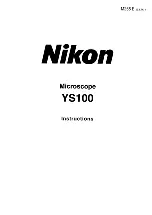
5 Various observation methods .....................................................................................................
23
5-1 Transmitted phase contrast observation method ..............................................................
23
1
Centering the ring slit for phase contrast .............................................................................................................25
5-2 Transmitted simple polarization observation method ....................................................
26
1
Adjusting the crossed Nicol .............................................................................................................................................28
6 Image acquisition ..................................................................................................................................
29
1
Camera adapter ..........................................................................................................................................................................29
7 Glossary of optical performance terminology .............................................................
30
8 Troubleshooting ......................................................................................................................................
32
9 Specifications ............................................................................................................................................
34
10 List of optical performances .....................................................................................................
35
11 Assembly ....................................................................................................................................................
37
11-1 Assembly diagram .......................................................................................................................................
37
11-2 Assembly procedures ...............................................................................................................................
38
1
Attaching the intermediate attachment and the tube ...............................................................................38
2
Attaching the camera adapter ......................................................................................................................................38
3
Attaching the eyepieces (WHB10X, WHB10X-H).............................................................................................39
4
Attaching the eyepiece micrometer ..........................................................................................................................39
5
Attaching the objective .........................................................................................................................................................40
6
Attaching the specimen hold plate CX3-SHP or the specimen holder CX3-HLDT .........41
7
Attaching the polarizer (U-POT) .....................................................................................................................................41
8
Connecting the AC adapter and power cord ...................................................................................................42
9
Attaching the allen wrench holder .............................................................................................................................43
Summary of Contents for CX43
Page 28: ...24 1 2 3 4 5 6 9 7 a a 8 b ...
Page 31: ...27 CX43 2 3 4 5 6 8 9 b a c d 7 1 ...
Page 50: ...Memo ...
Page 51: ......



































